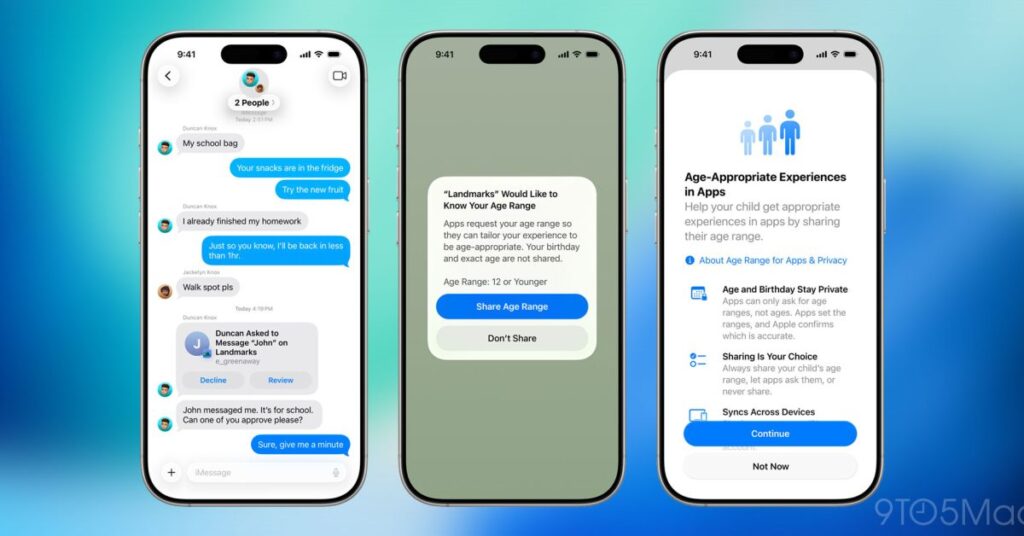
Apple has announced a comprehensive suite of updates designed to bolster parental controls and enhance child safety across its platforms. These updates, part of the upcoming iOS 26, iPadOS 26, macOS Tahoe 26, watchOS 26, visionOS 26, and tvOS 26, aim to create a safer, more transparent, and age-appropriate digital environment for children and teens. The enhancements are set to roll out this fall.
The new features extend existing parental controls, offering smarter management of Child Accounts, the ability to share age ranges with apps, and mechanisms to limit risky interactions. These updates are built with privacy and security at their core, reflecting Apple’s ongoing commitment to user safety.
Streamlined Child Account Setup and Enhanced Defaults
Apple’s Family Sharing has long included Child Accounts, but the process is now more streamlined. With iOS 18.4 and newer, default child-safety settings are applied immediately, even if parents choose to complete the setup later. In iOS 26, the system will guide parents to confirm their child’s birthdate, converting the account into a Child Account if necessary, thus unlocking the full suite of parental controls.
This development follows Apple’s continuous efforts to simplify parental controls, ensuring that safety measures are in place from the outset. The proactive guidance provided by the system aims to minimize the risk of oversight in setting up these accounts.
Privacy-Focused Age Sharing with Apps
Among the standout features is a new method for parents to share their child’s age range with apps, rather than an exact birthdate. This allows developers to tailor age-appropriate experiences while safeguarding the child’s privacy. The new Declared Age Range API enables developers to request this information, with parents maintaining control over what is shared.
According to Apple, this system prevents unnecessary data collection for basic apps like weather or sports scores, ensuring that privacy remains a priority. This approach aligns with broader industry trends emphasizing data minimization and user consent.
Expanding Protections for Teens
Previously, Apple’s stricter content defaults were limited to children under 13. With iOS 26, these protections will extend to teens aged 13–17, incorporating web content filtering and Communication Safety by default, even for those without formal Child Accounts.
“These additional protections include web content filters and Communication Safety, and make use of the newly introduced more granular age ratings on the App Store,” Apple stated.
This move represents a significant expansion of Apple’s safety protocols, acknowledging the unique challenges faced by teenagers in the digital space.
Granular Age Ratings on the App Store
The App Store will introduce more granular age ratings, adding 13+, 16+, and 18+ distinctions to better align with adolescent usage patterns. These ratings will integrate directly with Screen Time and Ask to Buy, enhancing parental oversight.
This development follows a broader industry shift towards more precise content categorization, allowing parents to make informed decisions about app suitability.
Improved Communication Controls
Parents will gain greater control over their children’s communications. When a child wants to contact a new number, parental approval will be required directly from the Messages app. This approval process will extend to third-party apps through Apple’s new PermissionKit framework, which facilitates contact approvals in a privacy-conscious manner.
This enhancement reflects growing concerns about online interactions and the need for robust parental controls in managing children’s digital communications.
Additional Family-Oriented Updates
- App Store product pages will indicate if apps contain user-generated content, messaging, or advertising capabilities, and if they include parental controls or age assurance.
- When app content restrictions are set, apps exceeding these ratings will not appear in certain App Store sections.
- Parents can grant exceptions for app downloads that exceed content restrictions, with the ability to revoke permission via Screen Time.
- Communication Safety will now intervene in FaceTime video calls and blur nudity in Shared Albums in Photos.
These updates build on Apple’s existing efforts to provide a secure and appropriate digital environment for children. The enhancements reflect ongoing advancements in technology and the evolving needs of families in managing digital interactions.
All of these updates will be available later this year with the release of iOS 26 and its corresponding operating systems. For more information, visit apple.com/families.







